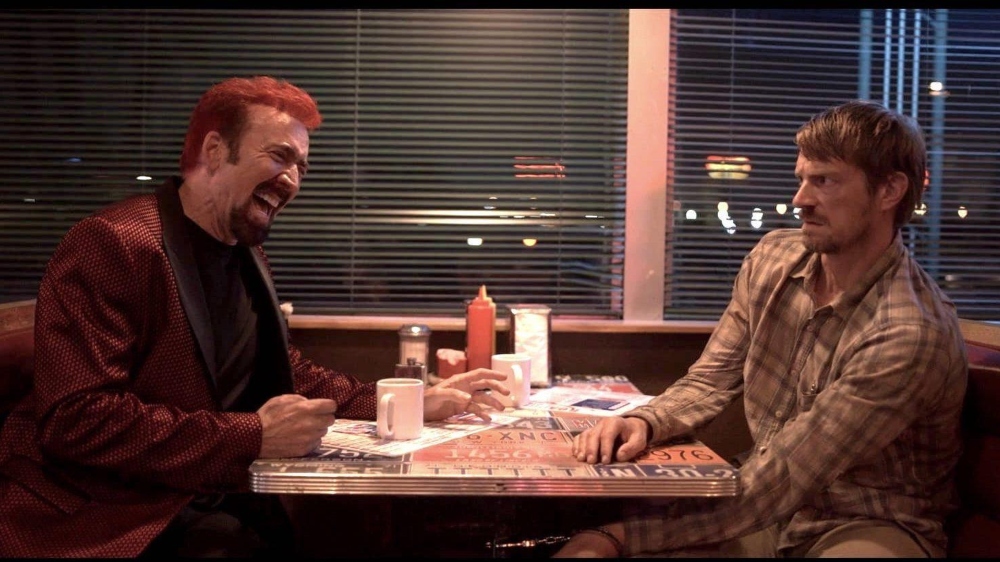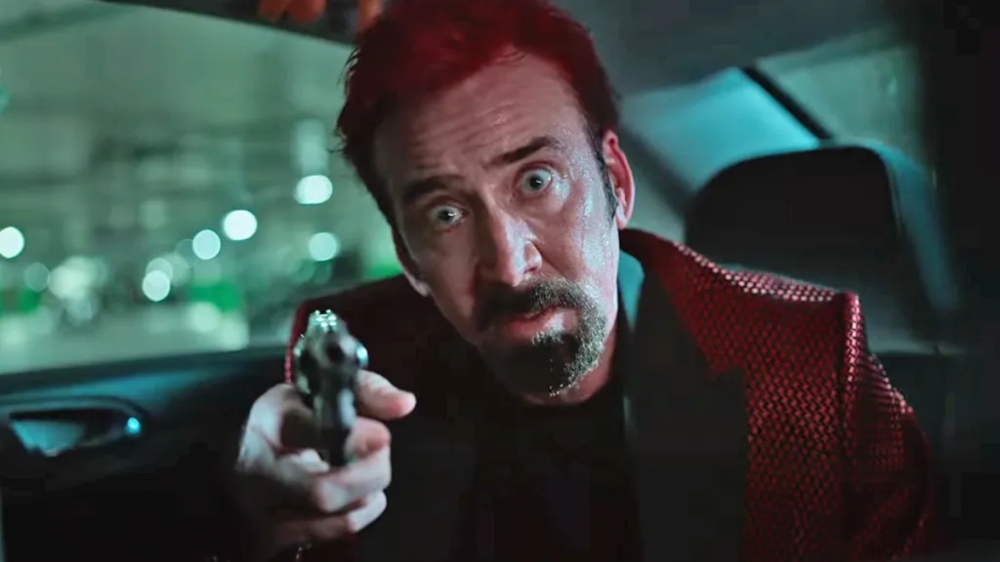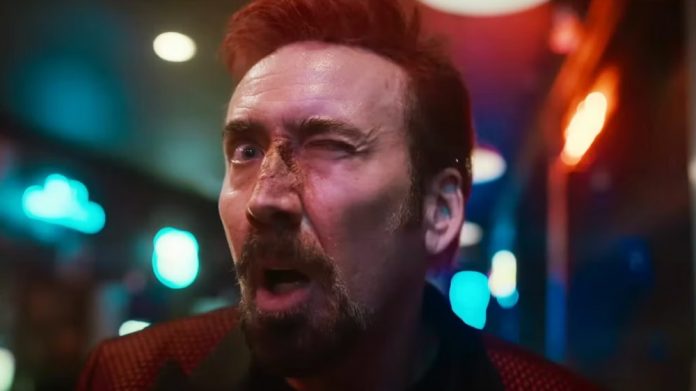The pop culture phenomenon known as Barbenheimer may have blown up the box office last weekend, but this weekend sees the return to theaters of an actor with all the “Kenergy” of an atomic bomb — Oscar winner Nicolas Cage, who turns in a vintage performance and goes “full Cage” in the gritty indie thriller Sympathy for the Devil.
Hitting theaters this weekend courtesy of RLJE Films, the film finds Joel Kinnaman playing a family man who’s in the midst of a medical emergency when a mysterious passenger (Cage) barges into his car and forces him to drive into the night at gunpoint through the desert roads of Las Vegas. A cat-and-mouse game ensues as the two actors trade blows and match wits over the course of the film’s brisk 90-minute running time.
Sympathy for the Devil is the latest movie from director Yuval Adler, the Israeli filmmaker behind Bethlehem, the Diane Kruger–Martin Freeman drama The Operative, and the 2020 thriller The Secrets We Keep starring Noomi Rapace, Chris Messina, and Kinnaman. He also directed the first two episodes of Season 2 of Ryan Phillippe‘s USA series Shooter.
Above the Line recently spoke with Adler, who talked about working with Cage on Sympathy for the Devil, the actor’s mesmerizing dance sequence, the origins of a one-minute monologue in the middle of the movie, and what he’s developing while waiting for Hollywood’s double strike to end.

Above the Line: How’d this script make its way to you and what about it sparked your initial interest? I know you’d worked with Joel on The Secrets We Keep…
Yuval Adler: 10 years ago, after my first film Bethlehem [broke out], I got an agent and they were sending me scripts, and I read this script. I pitched myself as a director and the producer didn’t take me, they took somebody else. And then every 2-3 years, I was checking, like, ‘Why is this film not made?’ and I would email the producer, ‘What’s happening with Sympathy? Change your mind already?’ You know?
And they’re like, ‘It’s here, it’s happening.’ And then every 2-3 years, I’d literally just remember, ‘Oh, I see it’s still not made.’ And at the end of 2021, eight years later, they finally answered, ‘Oh, we lost the option. It’s back to the writer.’ And I was like, ‘Oh really?’ And I called the writer, and I got the option. I bought the option [myself].
What I liked about this script was, again, the thriller aspect, how clean it is between these two guys with the past coming to get you and the identity stuff, and then the dark sense of humor. It was already in the script, and with Nic, we pushed it to the next level, but there’s something funny as hell in the script. It’s not a comedy, but the tonality of it I really, really liked.
ATL: Obviously, you had a prior relationship with Joel, who makes for a great protagonist here, but tell me about casting Nic Cage, who gets a chance to go “full Cage” in this movie, so tell me how you landed him for this project.
Adler: Well, like many things, it kind of happened as the film came together. Joel’s agent is also Cage’s agent, and they were like, ‘Nic is available,’ and I was like, ‘Wow, really? Sure! Let’s talk.’ There was a whole drama about whatever, and then suddenly I met him, and the first thing we talked about, he was like, ‘You know, I read about you’ — because I have a background in philosophy — and he said, ‘I read about you, that you’re really into metaphysics and philosophy, and I think I want to go really ontological with this guy.’ And I was like, ‘Yes, let’s do it!’ And we talked about [John] Milton — there are lines from Milton, even in the trailer — so we bonded first [over] that. Like, “Let’s take this thing to a kind of metaphysical level. This guy is coming from another dimension — not in a horror way but in a human way.”
And then a lot of it was about the humor. We found it extremely funny and he came up with all these ideas about how the guy should look and how the guy should talk, and then on the set, what would happen is, we would do a take and when I’d see he was wired and he was into it, I would just not say “Cut.” I would just let him [go], and he’d start doing stuff. And as the director, you’re their first audience, you know, so he would see me laugh behind the monitor and I would giggle or whatever, and he would just see me and say, ‘That’s good, huh?’ And he’d do it again even more. I was egging him on and he’d go with it.

ATL: Did the script change at all when Nic came aboard?
Adler: First of all, it changed locations because we moved it to Vegas and it used to be New York before, so yeah, it changed a lot. He would come up with ideas and come up with things he wanted, and sometimes I would send him lines and we would put them in the film. The script was like a skeleton. There’s a lot of great stuff in the script that was never touched, but there was a lot of stuff that was added in the moment — not necessarily on the set, a lot of times it was added in rehearsal, but some of the stuff was even added on set.
ATL: I watched this movie with my Dad and we both loved Nic’s one-minute monologue about The Mucus Man, so what can you tell me about that incredible scene?
Adler: Wow, really? That’s Nic. That was totally Nic. He came to me and said, ‘Look, I have this thing and I want to tell a story. I’m not even going to tell you what it is now, it’s going to be a surprise. You’re going to love it.’ And he brings it and he does it, and I think it’s fantastic. Again, I’m laughing my ass off or whatever, but I think it’s too long. And I say, ‘Look, it’s too long. In order for it to be in the film, we have to shorten it,’ and he was like, ‘No, I’m not going to shorten it,’ and then he shortened it.
And I had to fight for it to stay in the film. Later on, you know, the powers that be, eventually, they always want to cut stuff — “do we really need it?” — and I was like, ‘no, no they’ll remember the film for that,’ you know what I mean? He just came with it one day and then we kind of integrated it, and also, in post-production, we gave it kind of special treatment.
ATL: It’s a great idea for an animated movie. I could play that monologue for my 4-year-old niece and she’d love it.
Adler: Exactly!
ATL: You mentioned cutting things for time… were you contractually obligated to deliver a 90-minute cut?
Adler: No. First of all, I was initially kind of worried that the film was going to be shorter because of the speed of the dialogue, and then I realized, ‘No, I can do stuff with the drives and with silences and whatever.’ And then we got barely to 90 [minutes] — it was like, 87, 88 — and I said, ‘Guys, don’t you want it to be 90?’ And they said, ‘Oh, we don’t care,’ and I was like, ‘Well, I want it to be 90,’ so I made it 90. But they didn’t care. It was about to land there somewhere. I love short, 90-minute films. I don’t understand why films are like… because unless they are fucking Barry Lyndon, then it’s fine, but Superman needs to be two hours and 40 minutes? Like, seriously?
ATL: I wanted to ask about Nic’s costume with the red jacket and the red hair. Was that him or was that in the script?
Adler: That was him. That was totally him. He suddenly started to send me pictures, like, ‘What about this? What about that? What about this jacket?’ And there was a reason for it. The idea is that this guy, that’s his night. He’s found Joel, or he thinks he’s found Joel, and he’s gonna have the fun of his life before… X. Right? So he’s kind of dressed up and he’s going to have fun.

ATL: Was it meant to conjure a devilish vibe? I know the idea is that you’re not sure who is the Devil in this movie.
Adler: Yeah, exactly, but no, he’s more like a Vegas entertainer. You know what I mean? I would laugh, and he’s burning shit up in the diner and he’d come out and I’d look at him, and he’d be like, ‘We’ve got a great show for you tonight.’ That’s how he comes out from the kitchen with the fire behind him. It’s an entertainer vibe.
ATL: I wanted to ask about the Boston accent because I’m from Boston, so I’m tough on the accents. Was that in the script or just something he wanted to do?
Adler: Yeah, because the story has this thing about Boston, right? So he wanted to [do the accent].
ATL: Was there ever any consideration of including a flashback of the inciting incident here?
Adler: Eh, for two minutes. But I think, in the end, they live in their own universe. Even at the end, when there are all these police and all this stuff, you don’t care about that, it’s between them, you know what I mean? So to cut to a flashback, it would’ve been a [mistake]. There was a moment where [we considered] a few flashes of images, but do you remember in Silence of the Lambs, they said, never cut away, stay on their faces. Right?
ATL: That’s smart. Well, I have to ask about the dancing scene because I feel like that could be the latest iconic scene in Nic Cage’s filmography.
Adler: Exactly. Again, it was like we… it’s funny, in the original script, the passenger goes around doing his passenger mayhem shit, and singing Elvis, like “Love Me Tender.” Not “Love Me Tender” but “Are You Lonesome Tonight?” And he sings that, and Nic says, ‘Ugh, me and Elvis again? There’s this thing with me and Elvis and I don’t want to do that. I can’t do that, I’ve done it.’ OK, so we let that go.
But it was in a diner, so there was a jukebox. So I said, ‘Look, there’s a jukebox. You wanna do a jig, you wanna do a dance or something?’ So he’s like, ‘Yeah, but let’s pick something that I can really boogie to.’ So he starts emailing stuff, but it’s all stuff from the ’70s. And then we landed on that song, but we had to fight to get the rights to it. Because again, we weren’t a big-budget film and these things are expensive, but we got the rights for it, and that was it.
The funny thing about this scene for me was… I’ll tell you an interesting story. I said, ‘I wanna do it in one take.’ Not one take, one shot. So we do it a couple of times and then I figure out, ‘No, I need more coverage. I want it from here, I want it from there.’ But you already told them you’d do it in one shot. So they’re like “Why? You said it was going to be one shot and we did it in one shot. C’mon, do it in one shot!’ And I’m like ‘No, there’s more juice there, I don’t like this part, I don’t want one shot. I want it good!’ So I learned never to say in advance that I want one shot. Even if I’m doing one shot, don’t say it. Only after you have it, you can say, “Oh, that’s enough, we got it in one shot.”
ATL: What are you working on next?
Adler: Yeah, I’m writing stuff now. I’m writing a bunch of stuff — an international, industrial espionage show, and I’m writing a paranoid erotic thriller dark comedy set in New York about a husband and wife. There’s some weird stuff.
ATL: That sounds interesting. Do you think that Salem Village project will ever come back around?
Adler: How do you know about that?
ATL: I’m The InSneider, baby.
Adler: Yeah, exactly. No, I don’t know, it was a long time ago…
RLJE Films will release Sympathy for the Devil in theaters on Friday, July 28.



